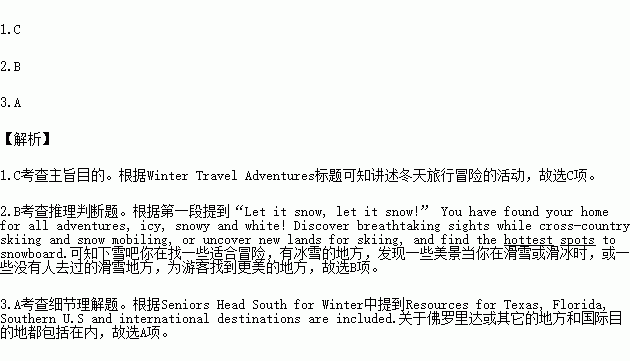题目内容
Winter Travel Adventures
“Let it snow, let it snow!” You have found your home for all adventures, icy, snowy and white! Discover breathtaking sights while cross-country skiing and snow mobiling, or uncover new lands for skiing, and find the hottest spots to snowboard. Informative links below will get you on your way to a winter wonderland journey.
Seniors Head South for Winter
A feature article on the annual(一年一次的)migration of Winter Texans and Snow Birds heading to warmer places for the winter. Resources for Texas, Florida, Southern U.S and international destinations are included.
Skiing and Snowboarding adventures
You either love it or hate it, strapping(用带子系)a pair of boards to your feet and thrusting yourself down a snow-covered mountain at a speed of 60 miles per hour. If downhill running is your adventure game, connect with the best resources for adventures, vacations, ski trips and destinations.
Cross-country Skiing Adventures
All ages can find pleasure and exercise on a good pair of cross-country skis. Discover the winter back-country on your next adventure. Connect with adventure opportunities, outfitters, equipment sources, destinations and more.
Snowmobile Adventures
Take to the snow-covered backcountry and discover white adventures where only snowmobiles can take you. You can find information from a resource center about adventure tours, group tours, clubs, equipment, destinations, best trails and more.
Snowshoe Adventures
Foot power proves to be the ultimate (首要)dependable transportation, and that applies to winter trekking (艰苦跋涉)through the backcountry. A good pair of snowshoes can get you to places when nothing else can.
1.The purpose of this text is to _______.
A. introduce some of the famous scenic spots
B. introduce the hottest spots to snowboard
C. provide readers with several choices of traveling.
D. provide information of different travel agencies
2.The underlined words “hottest spots” (in paragraph 1) mean _______.
A. places with the highest temperature
B. the most popular places for travelers.
C. places with hot springs
D. the most popular winter games
3.If you wish to spend your winter abroad, which group would you join?
A. Seniors Head South For Winter
B. Snowmobile Adventures
C. Skiing and Snowboarding Adventures
D. Cross-Country Skiing Adventures

